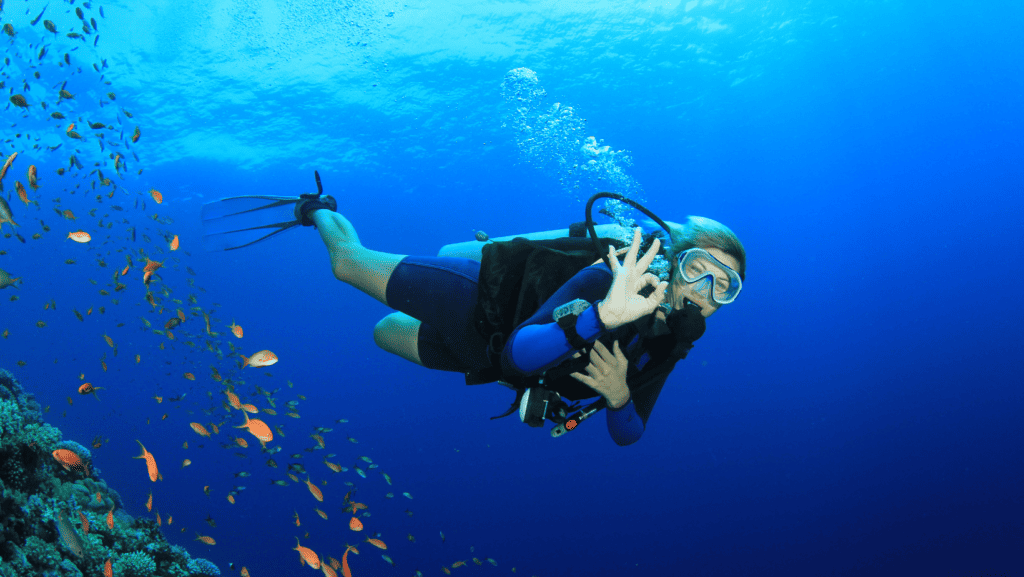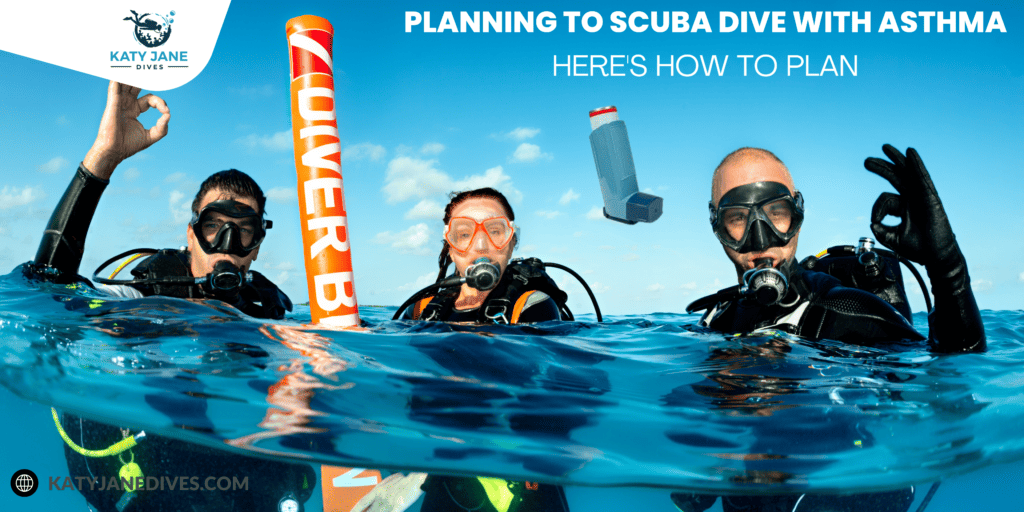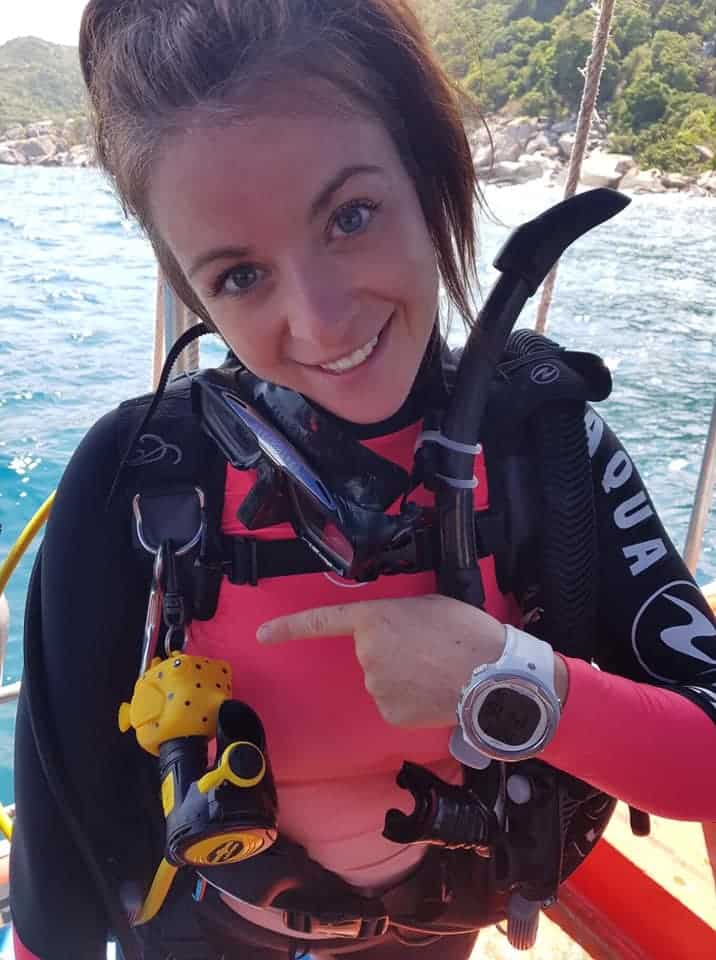Planning a scuba diving trip is always exciting, but overlooking medical conditions can be dangerous.
If you have asthma and plan to dive, you will want to read on.
It is possible to scuba dive with asthma, but according to the SCUBA Diving and Asthma: Clinical Recommendations and Safety Journal, many dive schools require some asthmatic patients to pass a bronchial provocation challenge to receive medical clearance to dive.
Each condition varies, and it often depends on the triggers and the severity of your asthma.
If you’re an asthmatic hoping to enjoy the beauty of the underwater world, you may still be able to go scuba diving. But here’s what you’ll need to know.
This article is not medical advice and is merely to help you dive safely, please contact your instructor and dive doctor for advice.

Table of Contents
Can Asthmatic Patients Scuba Dive: What Are the Rules?
Before enrolling in any scuba diving training, you will be given a medical declaration to complete by your instructor or dive school. This Medical statement is produced by the World Recreational Scuba Training Council (WRSTC). Most of the best-known scuba diving training agencies will use this medical form created by the WRSTC. These include all of the big hitters, such as PADI and SSI.
As of 2020, the WRSTC medical statement was updated to avoid excluding people who had medical conditions many years ago that were no longer relevant to their ability to scuba dive. Asthma was one of these conditions. Previously any form of Asthma at any time in your life would have seen you sent to a doctor.
These days the form states that if you have a ‘yes’ answer to Asthma within the last 12 months that affects your ability for physical exertion, then you will need to see a Doctor, and then they can decide the best course of action for you.
The UK Diving Medical Committee recommend that you do a PF test twice a day, starting three days prior to your planned dive. You need normal results 48-hours before the dive otherwise your trip should be called off.
Can You Scuba Dive with Asthma?
Asthmatics can go scuba diving, but a doctor’s clearance may be required dependent on whether you have active asthma or no longer suffer from asthma symptoms. This requires visiting a doctor local to you. Your Doctor will assess you, and you may be tested via the peak flow measurements, stress test, and other bronchial provocation challenges.
This will enable the doctor to examine your asthma’s severity and make educated decisions. There are many asthmatic divers, but scuba diving may be a no go for anyone suffering from temperature, exercise or emotion-induced asthma.
Another factor to consider when thinking about potential asthmatic divers are the rules in your specific country. Many countries have different rules regarding the tests you may have to pass.
For example, in Australia, all individuals planning scuba diving must pass pulmonary function tests.
Planning to Dive: Here's What an Asthmatic Diver Should Do

So now you have your sign-off from the doctor and want to plan to go on a scuba diving trip. As you will have learned in your course, recreational scuba divers always have a contingency plan. This is extra important when scuba diving with a condition that affects your lung function.
Here is a list of the steps that I would recommend when planning to dive.
Have the proper insurance (Divers Alert Network are the most popular choice)
Take enough medication with you
Have your medication at the dive site
Inform your dive center or instructor and tell them where to find your medication
What Are the Risks of Diving with Asthma?
Despite receiving medical clearance to take part in recreational scuba diving. Asthmatic divers still have increased risk. Here are some of the risks that you may be exposed to:
Bronchospasms are more likely to occur in asthmatic divers due to breathing compressed air.
Trapped gas can expand and lead to arterial gas embolism
Pulmonary barotrauma is caused by an inability to release air from the lungs on ascent
The 2003 British Thoracic Society recommends against diving for exercise, cold, or emotion-induced wheezing because these are the most common triggers for an asthmatic diver
Precautions to Take
The biggest precaution you can take when planning on scuba diving is arguably your insurance policy. Divers Alert Network (DAN) are the most popular amongst the recreational diving community.
Diving medicine is constantly evolving and information can change. DAN offer their members 24/7 advice base on the most current evidence from the hyperbaric medical society. They also have lots of information online about Asthma and Diving.
As an asthmatic diver you should also carry your medication with you at all times. If you do not have it with you at the dive site, avoid diving.
Do's & Don'ts for Asthmatic Divers
Here are some key dos and don’ts for scuba divers with asthma:
Dos
Be honest on medical statements
Seek advice from a diving doctor
Stay up to date with the latest information through Divers alert network (DAN)
Have your medication at every dive site ready to use if needed
Inform your dive centre, instructor or buddies to help them help you
Have proper recreational scuba diving insurance
Don'ts
Lying on your medical form
Not bringing your medication to the dive site or trip
Keep your condition a secret from others diving with you
Allow anybody to convince you to dive without medical clearance
Summary - Final Thoughts
An asthma attack underwater could be fatal and that’s why asmathic divers should take protocols seriously, although asmthatics can dive this is dependent on the circumstances.
Use the advice highlighted in this article and visit DAN, PADI or visit your diving doctor for more detail. This article is not medical advice and has merely been written to help you dive safely and find the correct guidance.
FAQs
Speak to your doctor or dive instructor a week prior to your dive, giving you enough time. You can then check to see what test you can or need to carry out.
Here are some examples of tests:
Prospective Pulmonary Function Testing: Get your pulmonary function test results before your dive
Exercise Test: A doctor monitors your asthma during the exercise bike
Lung Function Tests
According to the UKDMC you can take albuiterol half hour before diving to reduce the risk of bronchospasm. You cam use Albuterol before leaving the boat. You cannot dive for 48-hours once you have used a rescue inhaler if your don’t have well controlled asthma.
Keep your inhalers on the boat and be sure to make your dive instructor aware of your condition way in advance. Instructors and dive buddies should be made aware of where your rescue medication is stored.
Other Recommended Articles
- Can you scuba dive with glasses
- Can you scuba dive with high blood pressure
- Can you scuba dive while pregnant
- Can you scuba dive with a beard or moustache
- Can you drink alcohol and scuba dive
- Can non swimmers do scuba diving
- Can you scuba dive after flying (what’s the risks?)
- Can you scuba dive with epilepsy?

